This series of blog posts tells the stories of the people affected by chhaupadi, with a view to exploring different aspects of the practice in depth. All testimony and photographs in this series have been made available with the relevant subject’s express consent. A general introduction to chhaupadi is available here and there are more photographs in this album.
19 year-old Durga comes from a community that practices an orthodox form of chhaupadi. The prescriptions are strict and customary enforcement is rigorous. She gives some examples, drawing on her own experience, to explain what this means in practice.
Durga during her interview
“My family is very traditional and does not even allow me to enter the compound of our house. When I start menstruating, I have to stay away from this area for seven days. During this time, I am also forbidden from drinking or eating any milk products—if I do, my family believes that the buffalo or cow that gave the milk will become impure, and any milk that it produces can no longer be offered to the gods in our temples.” Almost every imaginable aspect of her life is circumscribed during this time in some way—even down to her own personal hygiene. “I am only allowed to bathe during the first day of my period, and then on the third, fifth and seventh day”—regardless of whether she is actually still menstruating at that point. In addition, she and the other banished women are forbidden from touching communal water taps in the village. Their community has installed separate chhaupadi taps so that even the girls’ water source is segregated.
Shepherds on the terraces surrounding Malika
What is it about Malika village that makes it so resistant to chhaupadi reform? Located in Dailekh District, the community is nestled between steep hills reaching altitudes of over 4,000 meters. There are no paved roads connecting the village to the closest town, and landslides often cut it off from surrounding areas (my colleagues and I had to walk for five hours to reach it). Given its remoteness, the lack of economic opportunity in Malika is perhaps unsurprising. Durga’s father (just like many men in the area) left the community to find work in India, where he serves as a contract laborer, leaving Durga’s mother to look after the farm. The Nepali government’s policies to eradicate chhaupadi have many obstacles to overcome if they are going to have any meaningful impact in this community.
A typical farmhouse of Dailekh District – taken close to a neighboring village of Malika
In 2005, the Supreme Court of Nepal declared chhaupadi an unconstitutional practice in a landmark ruling, using its powers to bring the legal framework of the time in line with the former Constitution. It issued a directive order requiring the government to take a number of measures to tackle the practice. The Ministry of Women, Children and Social Welfare accordingly introduced the Chhaupadi Elimination Directive in 2008, formally committing the government to, among others, a public awareness campaign and the introduction of programs for social, financial and political empowerment of the affected women and girls.
This Friday, 17 August 2018 (or Bhadra 1, 2075 in the Nepali calendar), marks another milestone in the legal battle against chhaupadi. On this day, the Criminal Code Act 2047, which contains provisions that criminalize the practice, will enter into force. Anyone who forces a girl or woman into a chhau goth will be liable for a fine of NRs 3,000 (approximately USD 30) and / or up to three months’ imprisonment.
Photograph taken from the dirt road leading to Malika
The Nepali government and civil society have the tools they need on the statute books to eliminate chhaupadi, but can the long arm of the law reach Malika and make a difference for girls like Durga? Enforcement of laws criminalizing similar traditional practices (such as child marriage) is often lackluster, owing to insufficient resources for effective implementation and the deeply-rooted social beliefs that underpin the practice—beliefs that in many cases are held by the very agents of the state who are expected to enforce the law. For this reason, there is consensus among civil society actors that the law is in and of itself insufficient to eradicate chhaupadi. When combined with other advocacy measures, however, it becomes an important tool in the anti-chhaupadi toolbox.
Durga told me that she knows very few girls who would be willing to file a criminal complaint against their parents. However, she believes the law will have an important deterring effect: “it will help if people realize that it is illegal”. In order to ensure that the legislation has this impact, it will be important for NGOs to raise as much awareness as possible about the law and how it works. This will give young women seeking to escape the practice a very strong argument that they can raise with their families, many of which are already taking gradual steps to moderate their chhaupadi practice.
Durga after her interview, immersed in tought
If there are any brave young women and girls who would be willing to hold their families criminally liable for forcing them into the chhau goth, it will be important to give them access to legal aid. This will help to ensure that correct procedures are followed in registering their claims and that they are fully aware of the steps they need to take to build a strong case. Such advice can only be given by experienced legal practitioners, as they will depend on the facts of each individual case. Fortunately, NGOs such as the Forum for Women, Law and Development (FWLD), a partner of the Centre for Agro-Ecology and Development (my host organization), offer such pro bono services to claimants who would otherwise be unable to afford them.
Photograph taken at the FWLD office in Kathmandu during a meeting attended by CAED Executive Director, Samita Pradhan (second from left). CAED and FWLD have analyzed the extent to which the government has adequately prepared for the enforcement of the criminalizing chhaupadi in a report for the UN Committee on the Elimination of Discrimination Against Women. Courtesy of FWLD.
With such a multi-pronged approach, Nepali civil society can use the law criminalizing chhaupadi that will enter into force this week to challenge the practice from multiple angles. As with most movements for social change, rights advocates can achieve the greatest results by tackling a given practice from different fronts as part of a concerted strategy. This is the best way to help girls like Durga, who doesn’t want to report her parents to the police, but fully intends to use the new law to her advantage. “I already know that for me, chhaupadi won’t end overnight,” she says. “This change will happen gradually, as awareness grows among my people.”
Posted By Caroline Armstrong Hall (Nepal)
Posted Aug 13th, 2018


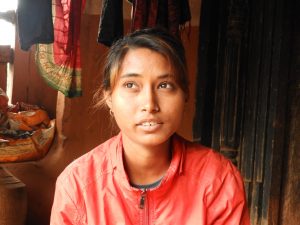
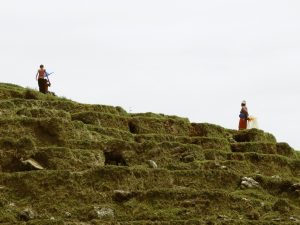
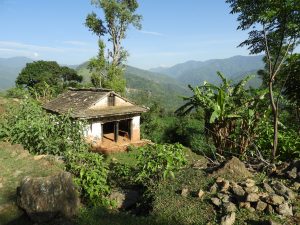
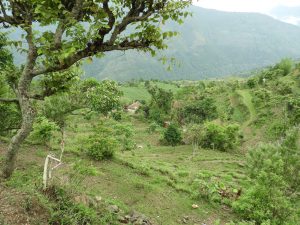
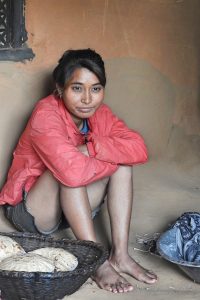
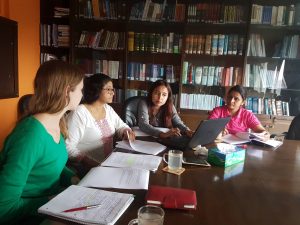
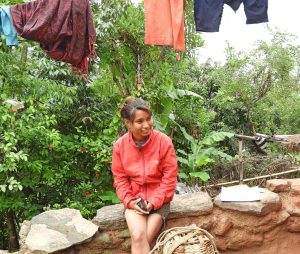
2 Comments
Corinne Cummings
August 14, 2018
Hi Caroline — immensely enjoyed reading this blog post that you wrote. Durga’s story was touching, and the pictures that you captured of her were excellent too. They went well with the sentiment of her story. I learned a few new things — before reading, I did not know that about milk. I am finding that the practice of chhaupadi is very extensive with these certain ritual practices, such as forbidding the consumption of milk and bathing on particular days of menstruation. I am relieved to hear that there are steep consequences for forcing a young woman/woman into a chhau goth; however, I also see the issue of reporting this crime when it’s the individual’s family forcing this practice. Good work, Caroline. I look forward to reading more interviews. Best, Corinne
Princia Vas
August 20, 2018
Very interesting and touching post! Loved the way you narrated it 🙂